Vtape is a Canadian artist-run centre located in Toronto, Ontario. It is Canada's largest distributor of video art, and the world's largest distributor of Indigenous and First People's film and video. The organization is run as a not for profit and is known for video art distribution, media preservation, exhibition programming, and training programs.
The imagineNATIVE Film + Media Arts Festival is the world's largest Indigenous film and media arts festival, held annually in Toronto. The festival focuses on the film, video, radio, and new media work of Indigenous, Aboriginal and First Peoples from around the world. The festival includes screenings, parties, panel discussions, and cultural events.
Deanna Bowen is an interdisciplinary artist whose practice includes films, video installations, performances, drawing, sculpture and photography. Her work addresses issues of trauma and memory through an investigation of personal and official histories related to slavery, migration, civil rights, and white supremacy in Canada and the United States. Bowen is a dual citizen of the US and Canada. She lives and works in Montreal.

Peggy Gale is an independent Canadian curator, writer, and editor. Gale studied Art History and received her Honours Bachelor of Arts degree in Art History from the University of Toronto in 1967. Gale has published extensively on time-based works by contemporary artists in numerous magazines and exhibition catalogues. She was editor of Artists Talk 1969-1977, from The Press of the Nova Scotia College of Art and Design, Halifax (2004) and in 2006, she was awarded the Governor General's Award in Visual and Media Arts. Gale was the co-curator for Archival Dialogues: Reading the Black Star Collection in 2012 and later for the Biennale de Montréal 2014, L’avenir , at the Musée d’art contemporain de Montréal. Gale is a member of IKT, AICA, The Writers' Union of Canada, and has been a contributing editor of Canadian Art since 1986.
Johanna Householder is an American-born, Canadian performance artist. Since the late 1970s Householder has made performance works and videos while writing and editing texts about performance art in Canada. In the 1980s, Householder, Louise Garfield and Janice Hladki were members of the feminist performance ensemble The Clichettes, using lip-synching and humour to critique contemporary culture. The Clichettes are considered "the quintessential Bad Girls of Canadian performance of the 70s" and have been called "dangerously and aggressively funny" by Clive Robertson (artist).
Christina Battle is a video and installation artist who was born in Edmonton, Alberta, Canada. She holds a Master of Fine Arts from the San Francisco Art Institute and a certificate in Film Studies from Ryerson University. She also holds a Bachelor of Science from the University of Alberta.
Deirdre Logue is a Canadian video artist and arts administrator, based in Toronto, Ontario.
Annette Mangaard is a Danish/Canadian filmmaker, artist, writer, director, and producer, whose films and installations have been shown internationally at art galleries, cinematheques and film festivals. With a practice rooted in theatrical drama and explorative documentary, Mangaard's films investigate notions and nuances of freedom within the confines of structural expectations. Mangaard's early films are filled with experimental visual effects, footage is often shot in Super 8 and reshot in 16mm and then printed optically frame by frame. The result is a grainy textured look, with images that are saturated in colour.
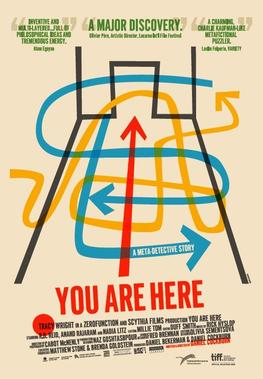
You Are Here is a 2010 Canadian philosophical speculative fiction film written and directed by video artist Daniel Cockburn, which he also co-produced with Daniel Bekerman. Cockburn's first feature film is "hyper-inventive and categorically hard-to-describe", initially billed as a "Borgesian fantasy" or a "meta-detective story", and later as "part experimental gallery film and part philosophical sketch comedy." In You Are Here, Cockburn makes use of the techniques and concepts he had honed over the previous decade as an experimental video artist with "a narrative bent", and "works them into a complex and unique cinematic structure." The film mainly follows a woman searching for the meaning behind a series of audiovisual documents from other universes, seemingly left purposefully for her to find, some of which are shown as vignettes concerning figures such as the Lecturer and the Experimenter interspersed throughout the film. She finds so many of them that they fill a space which she calls the Archive, and herself its Archivist. In time, the Archive appears to resist her attempts at cataloguing and organizing it, and she receives a cell phone instead of the usual document, leading to a fateful encounter with others.
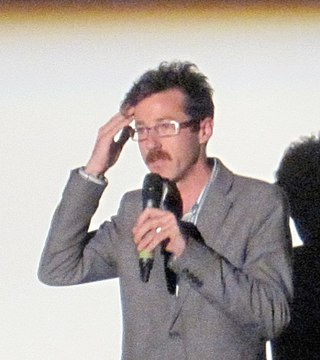
Daniel Ernest Cockburn is a Canadian performance artist, film director and video artist. Cockburn won the Jay Scott Prize in 2010 and the European Media Art Festival's principal award in 2011 for his debut feature film You Are Here.
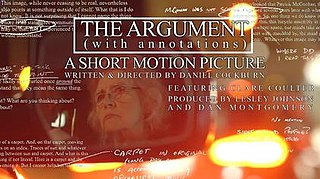
The Argument (With Annotations) is a 2017 Canadian-British short experimental drama film written, directed, and edited by video artist Daniel Cockburn. The short's first half attempts to deceive the audience into thinking it is a non-fictional video essay, revealing itself mid-way to be a work of fiction, the essay actually the work of the film's protagonist, an elderly professor (Clare Coulter). Submitted as Cockburn's thesis for the degree of Master of Fine Arts in Film studies at York University, the film had its world premiere at the 42nd Toronto International Film Festival, and has been warmly received by critics.

Metronome is a 2002 Canadian short experimental film which mixes appropriated film clips and video by video artist Daniel Cockburn to express ideas about rhythm and order, the self and other minds, and the digital age. Densely philosophical, the work is acknowledged as his international "breakout hit" after several locally successful short works, winning praise from critics, a mention, and an award.
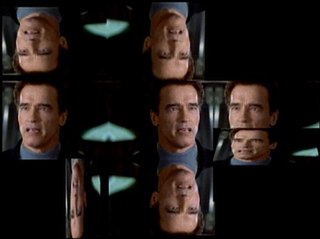
WEAKEND is a 2003 Canadian short experimental film created by video artist Daniel Cockburn, made through a remix of audio and video from The 6th Day, a Hollywood feature film about cloning starring Arnold Schwarzenegger. Commissioned by famefame for the third biennial Tranz Tech Media Art Festival, the work was awarded the Jury prize.
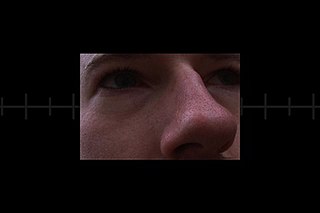
Nocturnal Doubling is a 2004 Canadian short experimental film by video artist Daniel Cockburn based on a thought experiment in Henri Poincaré's essay The Relativity of Space.
The Impostor (hello goodbye) is a 2003 Canadian short experimental film by video artist Daniel Cockburn, one of several works commissioned for The Colin Campbell Sessions and inspired by the makings of video art pioneer Colin Campbell for the Tranz Tech festival. Cockburn's video draws formally on Campbell's style while at the same time metaphorically expresses the artist's anxiety in making the video itself.
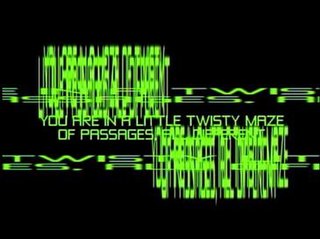
You Are In a Maze of Twisty Little Passages, All Different: Films and Videos by Daniel Cockburn is a 2009 Canadian experimental film anthology consisting of a curated programme of eleven short films by video artist Daniel Cockburn.
The Bad Idea Reunion is a 2010 Canadian short experimental film by video artist Daniel Cockburn, in which an infant muses in an internal monologue on the future and the forms its good and bad ideas will take.
Denominations is a 2003 Canadian short experimental documentary film created by video artist Daniel Cockburn about some time spent with American video artist Joe Gibbons.
Stupid Coalescing Becomers is a 2004 Canadian short darkly comic experimental film by video artist Daniel Cockburn about time running backwards as an act of rebellion.

Louise Liliefeldt is a Canadian artist primarily working in performance and painting. She was born in South Africa and currently lives and works in Toronto, Canada. Liliefeldt’s artistic practice draws directly from her lived experience and is apparent in the use of symbol, colour and material in her work. Other influences include Italian, Latin and Eastern European horror films, surrealism and African cinema. Taken as a whole, Liliefeldt’s work is an embodied investigation of the culture and politics of identity, as influenced by collective issues such as gender, race and class. Her performance work has developed through many prolific and specific periods.









